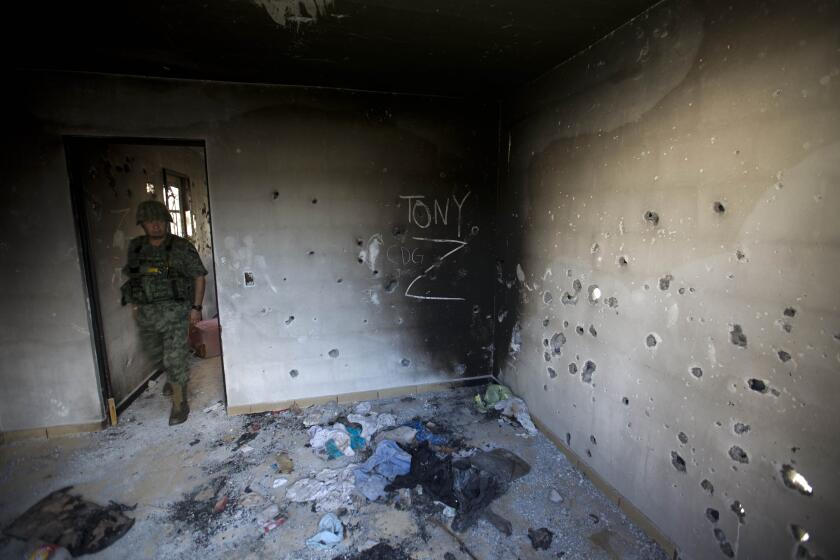Opponent of Pakistan Taliban leader assassinated
The assassination of a key rival of top Taliban leader Baitullah Mahsud, Pakistan’s public enemy No. 1, could set back the government’s bid to divide and conquer the militant group’s leadership, analysts said Tuesday.
Qari Zainuddin was shot while taking an early-morning nap -- allegedly by one of his own guards, Gulbadin Mehsud -- just after prayers. Zainuddin, who had gained attention by speaking out strongly against Mahsud and his tactics, was taken to a nearby hospital about 7 a.m. but died of head injuries a short time later.
Baitullah Mahsud, who is linked to Al Qaeda, has been blamed for several bombings -- including the 2007 assassination of former Prime Minister Benazir Bhutto, for which he denied responsibility -- and is believed to have built a production line of suicide bombers he can deploy at will.
The news dealt a blow to the government as it ramps up to attack Mahsud’s base in South Waziristan near the Afghan border, a tribal region where alliances shift rapidly and many act on the principle of “the enemy of my enemy is my friend.”
In a related development Tuesday, U.S. unmanned aircraft reportedly fired three missiles at Mahsud strongholds in South Waziristan, killing several dozen people and wounding as many as 60. The restricted area is isolated and dangerous, making it difficult to independently verify the reports.
Tribesmen and militants reportedly fired back but didn’t manage to bring down any of the drones.
U.S. officials as a matter of policy don’t comment on the activity of unmanned aircraft. By some accounts, several of those killed in one of Tuesday’s attacks were returning from the funeral of a colleague killed in an earlier drone attack.
Pakistani aircraft also attacked a compound in South Waziristan where a large number of militants were meeting.
Zainuddin, the slain Taliban leader, may have been preparing to challenge Pakistan’s preeminent Taliban leader politically or militarily. His recent strong criticism of Mahsud, whom he accused of working for “foreign elements,” prompted speculation that he was acting at the urging of Pakistani authorities.
The man who shot Zainuddin also wounded a guard before escaping.
No one took immediate responsibility for the attack.
In a part of the world where tribal politics are often fluid and marked by intrigue, Zainuddin was closely allied with Mahsud’s predecessor.
When that tribal leader was killed, paving the way for Mahsud’s ascent, Zainuddin became angry and split off, taking several hundred militants with him.
Zainuddin then laid down the gauntlet, calling on Mahsud’s followers to defect and join his side. Followers believe it was one of these supposed defectors who killed Zainuddin.
Analysts said the assassination could make opponents of Mahsud reluctant to ally with the government for fear that authorities won’t be able to protect them. It also could add to Mahsud’s reputation for ruthlessness and for his ability to reach enemies even when they’re well protected.
“In a way, it’s a setback,” said Talat Masood, an independent analyst and former general in the Pakistani army. “It may prevent others from coming forth.”
Pakistani Interior Minister Rehman Malik said the investigation would include a look at whether personal enmity was a factor in the slaying.
“Whoever is helping the government is being threatened by terrorists,” he told reporters. But “the public is not afraid anymore and such sacrifices will be made.”
The U.S. has offered a reward of $5 million for information on Mahsud’s location or other intelligence leading to his arrest. Zainuddin and Mahsud were of the same tribe, and the slain leader could have offered important intelligence on the inner workings of the Taliban, analysts said.
Although the assassination was a setback for the government, some analysts question the wisdom of using one tribal leader to fight another.
“This approach should be nothing more than a tactic,” analyst Masood said. “If you go too far, you’re likely to create a monster, for which we have a history. Pakistan already has too many monsters.”
Also Tuesday, police in Karachi said they had arrested five suspected Mahsud aides involved in raising money for the militant leader in activities that included bank robbery and kidnapping.
They also seized several automatic weapons and a stolen vehicle.
--
Special correspondents Nasir Khan in Islamabad and Zulfiqar Ali in Peshawar contributed to this report.
More to Read
Sign up for Essential California
The most important California stories and recommendations in your inbox every morning.
You may occasionally receive promotional content from the Los Angeles Times.









